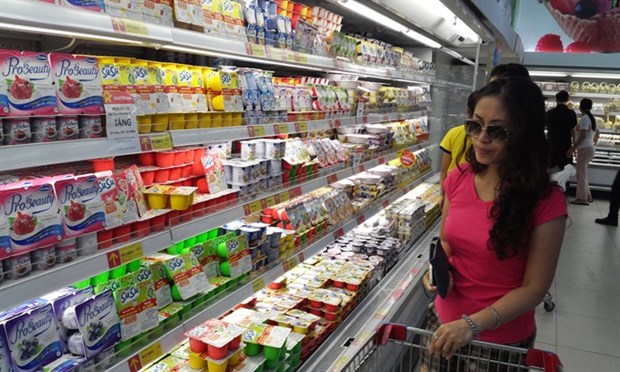Local retail market charms foreign investors
Vietnam, ranked among the world's top 30 retail markets with the best opportunities by A.T. Kearney, continues to prove its attractiveness his year.
 Customers shop at a Vinmart supermarket in Hanoi (Photo: VNA)
Customers shop at a Vinmart supermarket in Hanoi (Photo: VNA)Hanoi (VNA) – Vietnam, ranked among the world's top 30 retail markets with the best opportunities by A.T. Kearney, continues to prove its attractiveness as two foreign investors have entered the local retail sector this year.
After forming a partnership with Xiaomi Inc. of China, the Digiworld Joint Stock Company opened the first Mi Store in Vietnam in early January to distribute Xiaomi products like mobile phones, smart watches, portable chargers, LED lamps and vacuum cleaners. Mi Stores are expected to be present in 15 big cities nationwide by late 2018.
GS25 also opened its first store in District 1, Ho Chi Minh City, last month after establishing a joint venture with Sonkimland to become the first Korean brand to enter the fierce competition among convenience stores in Vietnam. It plans to open more than 2,500 stores in the country in the next 10 years.
The market has also witnessed several big mergers and acquisitions (M&As) in the retail sector in recent years, including the respective purchases of the Metro Vietnam and Big C Vietnam supermarket chains by Berli Jucker and Central Group of Thailand.
Aside from M&As, many major retailers from Southeast Asia have sought to partner with domestic businesses to develop retail stores in Vietnam, such as the partnership between Mapletree and NTUC FairPrice companies of Singapore with the Saigon Union of Trading Cooperatives (Saigon Co.op).
Meanwhile, Vingroup, a major conglomerate of Vietnam, also bought the supermarket chains of Ocean Mart, Vinatexmart and Maximark.
Vu Vinh Phu, former Chairman of the Hanoi Supermarket Association, said there are about 1,000 convenience stores and several hundred supermarkets and shopping malls in the country at present, a small number compared to the population of more than 90 million. Meanwhile, there are few capable Vietnamese enterprises like Saigon Co.op and Vingroup.
Therefore, the local retail market is a fertile sector for foreign retailers with capital, business technology, business governance and global purchasing and distribution networks, he added.
According to the Hanoi Supermarket Association, about 50 percent of the retail market share in Vietnam belongs to foreign firms, a figure which could be higher in reality. As a result, domestic retailers could shrink in the future since they lack experience, investment scale and manpower.
Insiders forecast the Vietnamese retail market will continue to be a magnet for businesses, and rural areas will remain an attractive destination in 2018 and beyond.
A report by market research company Nielsen shows that fast-moving consumer goods posted growth of 7 percent in rural areas in 2017, doubling their expansion in urban areas. While confectionary sales in some cities declined, they rose 15 percent in rural areas. The rural market has also become the main market for some companies.
Insiders have said if businesses make good use of traditional sales channels and develop distribution networks well, they will be able to dominate the rural market.-VNA












